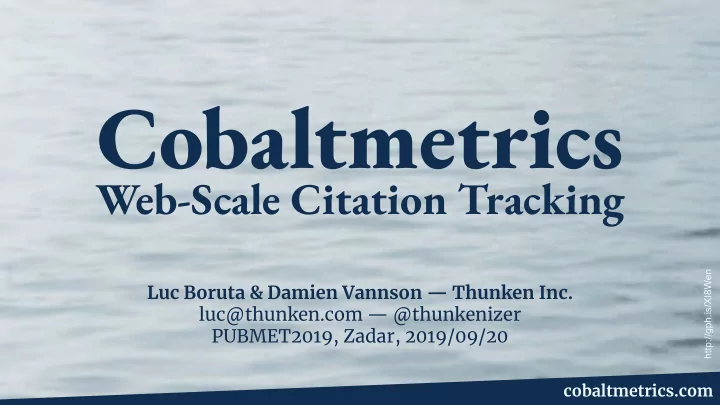

Cobaltmetrics Web-Scale Citation Tracking http://gph.is/XI8Wen Luc Boruta & Damien Vannson — Thunken Inc. luc@thunken.com — @thunkenizer PUBMET2019, Zadar, 2019/09/20 cobaltmetrics.com
cobaltmetrics.com http://gph.is/XI8Wen
Dear Santa cobaltmetrics.com http://theinclusive.net/article.php?id=268
cobaltmetrics.com http://gph.is/1NXRXtc
Attention vs. Impact Citations and altmetrics are proxies for impact. Citations and altmetrics measure attention. Attention correlates w/ impact. So do influence and privilege. Mentions and events are merely newish types of citations. cobaltmetrics.com
A partial landscape of citation aggregators ● Journal to journal: Web of Science, Scopus ● DOI to DOI: OpenCitations ● URL to DOI: ALM/Lagotto, Crossref Event data ● URL to URL: Altmetric, Plum, Cobaltmetrics cobaltmetrics.com
Common issues with citation aggregators ● Imbalanced datasets ○ Predefined lists of supported research outputs ○ Predefined lists of supported languages ● Irreproducible indicators ○ Dependency on 3rd party servers (short URLs, APIs) cobaltmetrics.com
Why should we care? Metrics are a sampling game. Imbalanced datasets reinforce discrimination. We are interested in low-frequency phenomena , and in distinguishing structural zeros from sampling zeros . cobaltmetrics.com
Weapons of math destruction “There is a moral obligation to challenge machine biases .” — Heather Staines, PIDapalooza’19 Algorithmic bias reflects the values of the humans involved in designing the algorithm and/or collecting the data. cobaltmetrics.com
cobaltmetrics.com https://gph.is/2xgF3te
Cobaltmetrics It is not up to citation aggregators to decide what is citable, our role is to observe all citation patterns on the web . The web is not FAIR (and will most likely never be) and that is just fine . cobaltmetrics.com
Cobaltmetrics Cobaltmetrics crawls the web to index hyperlinks and PIDs as first-class citations . The web is our corpus , and our URI transmutation API collates citations to all known versions of a document. cobaltmetrics.com
Design rationale Cobaltmetrics tracks all URIs, URLs, and typed PIDs. Cobaltmetrics can only be queried by URIs. Cobaltmetrics will never create new identifiers. Cobaltmetrics will never create new metrics. cobaltmetrics.com
Design rationale ✔ Lawrence et al., 2001, https://doi.org/10.1109/2.901164 ✔ http://dx.doi.org/10.1109/2.901164 ✔ doi:10.1109/2.901164 ✔ https://ieeexplore.ieee.org/document/901164/ ✔ https://bit.ly/2kEavO1 ✘ Lawrence et al., 2001 cobaltmetrics.com
Better a URL today than a PID tomorrow The ideal identifier should be persistent , findable, accessible, interoperable, and reusable... ...we all copy-paste from the address bar of our browser. cobaltmetrics.com
PIDs are not silver bullets There are billions of documents that will never get DOIs or any other fancy PID: old documents, grey literature, and the rest of the web . There are tons of documents with PIDs that are cited with no mention of their PIDs. cobaltmetrics.com
Compact IDs vs. good old URLs Cobaltmetrics’ citation index (February 2019): ● HTTP+HTTPS+FTP: 256 million URLs (98%) ● Every other scheme: 4 million IDs cobaltmetrics.com
cobaltmetrics.com http://gph.is/2OXLMRE
Are your metrics alt- enough? NO. cobaltmetrics.com
Are your metrics alt- enough? ● Bias in favor of English ● Bias in favor of traditional publication venues ● Bias in favor of traditional publication formats ● Bias in favor of short-term rewards (vs. long-term goals) ● …? cobaltmetrics.com
Selection biases: Wikipedia languages Altmetric: 3 languages (en, fi, sv) PlumX Metrics: 3 languages (en, es, pt) ALM: 25 most popular languages Cobaltmetrics: 180+ languages! cobaltmetrics.com
Selection biases: document types Strong focus on traditional peer-reviewed publications. Preprints are still treated as second-class documents . What about patents, clinical trials, law articles, etc.? What about non-textual objects , e.g. datasets or software? In Cobaltmetrics a URL is a URL , we do not discriminate. cobaltmetrics.com
Selection biases: PIDs vs. URLs Nothing lasts forever on the web: ● Link rot! ● Content drift! https://gph.is/2NehBG5 ● Outages! cobaltmetrics.com
Non-canonical URIs Non-canonical URI ≈ any ID that is not 100% FAIR, including but not limited to: ● Short URLs ● Proxy URLs ● Sci-Hub URLs cobaltmetrics.com
URI transmutation Transmutation = normalization + conversion ● Equivalencies we can compute (e.g. ORCID ⇄ ISNI) ● Equivalencies we must learn (e.g. short URL ⇄ URL) Our transmutation API is open and free, try it out! cobaltmetrics.com
URI transmutation example We remix 4M cliques of IDs from ORCID’s Public Data File. Example: ● orcid:0000-0003-0557-1155 → {scopus:55148973700} ● scopus:55148973700 → {orcid:0000-0003-0557-1155} ● mailto:luc@thunken.com → {orcid:0000-0003-0557-1155, scopus:55148973700} cobaltmetrics.com
A note on reproducibility Because we aggregate data from different sources, there are many moving parts . Our default strategy is to ingest the entire datasets , so that we control when and how data gets updated. Our API can return a fingerprint of the whole database, as well as the log of all the web resources we remix. cobaltmetrics.com
cobaltmetrics.com http://gph.is/2JCxAbw
Web-scale citation tracking ● Wikimedia (all projects, all languages) https://cobaltmetrics.com/docs/page/data-sources ● StackExchange/StackOverflow (all projects, all languages) ● US legal opinions (via CourtListener) ● Hypothes.is annotations ● Usenet posts (via the Internet Archive) ● CommonCrawl (3.1 billion webpages) cobaltmetrics.com
Web-scale citation tracking: transmutation ● Crossref https://cobaltmetrics.com/docs/page/data-sources ● ORCID ● PMC ● Terror of Tiny Town ● Unpaywall ● Wikidata ● ... cobaltmetrics.com
Cobaltmetrics in the context of open science ● Currently mostly closed-source, but... ● Everything on the website (data/docs) is now CC BY 4.0 ● Coming soon: ○ No more third party trackers ○ Pricing transparency cobaltmetrics.com
cobaltmetrics.com http://gph.is/XI8Wen
Recommend
More recommend